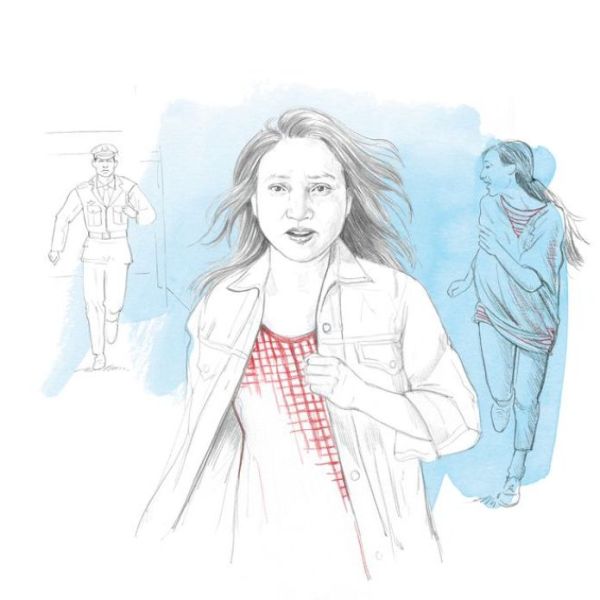How my assistant got into trouble with Beijing’s security apparatus and I got to know the Chinese authorities
Taken from: Beijing Journal on a Personal Matter
We have held off from publishing this story for a long time: A Chinese woman working as an assistant to DIE ZEIT has been detained for more than 12 weeks. We didn’t want to complicate diplomatic efforts being made to secure her release. But since these have yet to yield any result, we consider it necessary to make public now the fate of our colleague Zhang Miao. Angela Köckritz, our Beijing correspondent, is no longer in China. In this article, she describes her experiences with Chinese authorities- DIE ZEIT.
By Angela Köckritz, ex-Beijing correspondent for DIE ZEIT
One day three months ago, on October 1, 2014, I saw my friend and assistant Zhang Miao for the last time. It was 9 a.m. when she knocked on the door of my hotel room in Hong Kong. I was still in my pajamas. We had been out until late at night reporting on the Occupy Central protests. Miao was on her way back to Beijing, but I wanted to stay longer. We hugged. “Take good care of yourself,” I said. “I will,” she assured me with a smile. “And you, too. We’ll see each other again soon, anyway.”
Since then, Miao has disappeared. She’s being held in custody.
During my four years as a correspondent, I’ve often had to write about justice and injustice in China. I’ve attended press conferences at which government officials have told us that China is a country based on the rule of law, or what’s known in specialist circles as a Rechtsstaat. I’ve spoken to farmers who’ve been expropriated, who’ve tried to seek redress but failed, and instead been beaten and carted off to a black jail for supposedly fomenting unrest. I’ve interviewed civil rights activists who’ve sought, with infinite tenacity, to make China into what it pretends to be: a country based on the rule of law. I’ve visited dissidents who’ve been threatened and then vanished one day. Flipping through my telephone book, I see the names of many who are simply gone. When I mentioned this to a Chinese acquaintance, he shrugged his shoulders. Those kind of things happened to dissidents, but not to normal people, he said. Still, after a series of unfortunate circumstances, even the most guileless person can run into trouble with the justice system and security apparatus. It’s like with cancer: Everyone thinks they won’t get it. It’s always other people who are put in prison.
This time, it happened to Miao. And therefore to me, as well. I’d already known that laws in China are only valid when they serve the government’s interests. But experiencing it firsthand was something altogether different.
Miao is 40 year old; I’ve known her for six years. She lived in Germany for a long time. She had a German residence permit. In Hamburg, she was my Chinese teacher. We became friends. When she went back to Beijing two years ago, she started working in the office of DIE ZEIT. Returning wasn’t easy for her. Much seemed foreign to her, and she had grown apart from some of her old friends. But she soon made new friends in Songzhuang, an artists’ colony she lives in near Beijing.
Miao and I traveled frequently for the newspaper. We’d been through a lot together. In self-mockery, we and our photographer sometimes called ourselves san jian ke, the Three Musketeers.
Miao and I had flown to Hong Kong on Sept. 24, 2014. We’d been able to track how the protests had changed. On Sunday, Sept. 28, the police fired tear gas for the first time. We spent that night running through the streets until 5 a.m.
Troubled by the news that police had used tear gas, Hong Kong residents were driven into the streets. The crowds grew larger by the minute. The urban expressway, streets, pedestrian crossings and bridges were full of people. No one would have dreamed that there would be so many. That night, many– including Miao – believed Beijing would send in tanks. She kept on shaking her head in disbelief. “It’s just like back then,” she said. “In ’89, we also would’ve never thought the tanks would come.”
Miao was in grade school in 1989 when students demonstrated on Beijing’s Tiananmen Square. She lived nearby, and she often took water to the protesters. Late on the night of June 3, when the tanks started advancing, they passed by her apartment building. One can make out bullet holes in the building’s walls even today.
But on that night in Hong Kong, no tanks would come. Nor would they come on the next night or the one after that. Instead, in the following days, more and more people crowded into the streets. Fear gave way to euphoria. Strangers smiled at each other and took countless photos because they just couldn’t believe it: crowds of people wherever they looked, the biggest demonstrations on Chinese soil since 1989. “Wow! That’s incredible,” Miao kept saying. She was exhilarated, happy. A girl handed her a yellow ribbon, the symbol of the movement. She pinned it on herself. I could understand her, but I still asked her to take it off. “We’re journalists,” I said, and she took it off with a smile. A few hours later, she’d put it back on in another place.
To continue reading go to:
http://www.zeit.de/feature/freedom-of-press-china-zhang-miao-imprisonment










